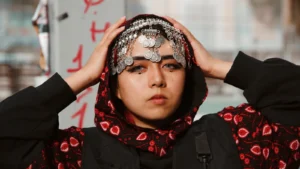Afghan breakdancer Manizha Talash, a member of the refugee team at the Paris Olympics, made international headlines when she was disqualified for displaying a powerful message: “Free Afghan Women.” The 21-year-old athlete, now living in exile in Spain, had spent four months planning her protest to bring global attention to the harsh realities faced by Afghan women under Taliban rule.
Talash’s protest occurred during her pre-qualifier match against India Sardjoe of the Netherlands, where she wore a light blue cape with the bold slogan written in white. The scene evoked comparisons to the “Hunger Games,” with Talash drawing inspiration from the film’s spirit of resistance. Despite the emotional weight of her message, she was swiftly disqualified by the governing body of breaking for violating Olympic rules prohibiting political statements on the field of play and podiums.
For Talash, this moment was deeply personal, not just political. Having grown up in Afghanistan surrounded by the constant sound of bombings, she carries the scars of war and loss.

“I am like a bomb because I grew up with bombs around me” Manizha Talash
Her participation in the Olympics was more than a competition; it was her opportunity to make a global statement about the oppression Afghan women face daily. “If I had to do it again, I would do the same,” she said without hesitation.
A Voice for Afghan Women: Fighting Gender Apartheid
Manizha Talash’s act of defiance goes beyond her personal story—it’s a call to action against the Taliban’s enforcement of gender apartheid in Afghanistan. Since the Taliban’s return to power in 2021, Afghan women have seen their rights eroded at an alarming rate. Education, employment, freedom of movement, and basic liberties have been stripped away, placing women in what Talash describes as “a cage.” Afghan women are now living under one of the most repressive regimes in the world, with girls banned from secondary education and women prohibited from working in many sectors.
Talash’s experience of fleeing to Pakistan for a year before moving to Spain reflects the struggles of countless Afghan women forced into exile or silence. Her protest at the Paris Olympics was a way to make their voices heard, to show the world that Afghan women will not be forgotten. “For four months, I thought about what I could do so that the cause of Afghan women would be heard,” she explained at a press conference.

In that same press conference, tears rolled down her cheeks as she emphasized the core of her message:
“My message was not about wearing the hijab or not; it was about freedom of movement and education for women in Afghanistan.”- Manizha Talash
Her tears, symbolic of the collective pain of Afghan women, served as a reminder of the urgency of this fight. She left two pearls under her eyes as a visual metaphor, representing the preciousness of women’s tears and the importance of protecting women from suffering.
The Global Fight Against Gender Apartheid
Talash’s defiance has resonated far beyond the Olympic stage, shining a spotlight on the brutal reality of gender apartheid in Afghanistan. The international community, led by Western governments, continues to press the Taliban to reverse their draconian policies on women’s rights. However, despite global condemnation, the situation for Afghan women remains dire.

“I’m also fighting for this generation, but also for future generations who will end up being illiterate.”- Manizha Talash
Her cape at the Olympics was more than just an accessory; it was a symbol of hope—wings for Afghan women to break free from oppression.
The fight against gender apartheid in Afghanistan is ongoing, and Talash’s bold stance has added new momentum to this struggle. By using her platform to speak out, she has highlighted the urgent need for global action to protect Afghan women and ensure their rights are restored. Her story has ignited a spark, reminding the world that the fight for gender equality in Afghanistan is far from over.
Manizha Talash’s bravery serves as a rallying cry for the international community to continue supporting Afghan women in their fight against the Taliban’s oppressive regime. Her defiance on the world stage at the Paris Olympics stands as a powerful symbol of resistance, embodying the hopes and dreams of Afghan women for freedom, education, and equality.
Follow Manizha Talash instagram
Relates stories
Zakia Khudadadi: Journey of Courage
Afghan Refugees’ Voices in US Election: A Call for Recognition and Action
Afghanistan Experiencing Turmoil Under Strict Taliban Rule
Afghanistan’s Taliban Bans Women’s Voices and Bare Faces in Public
Afghanistan’s Ministry Fakes Progress to Hide Cultural and Women Repression
















